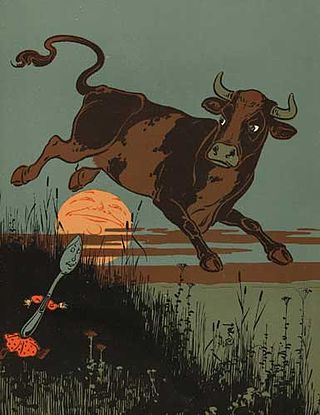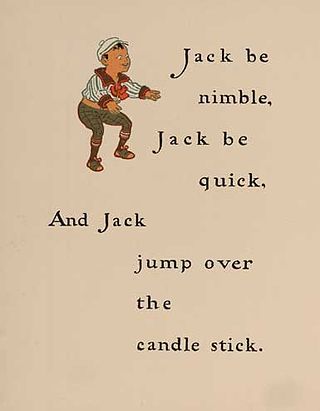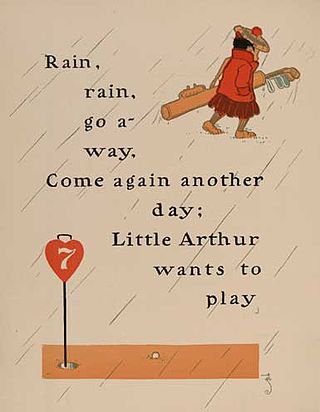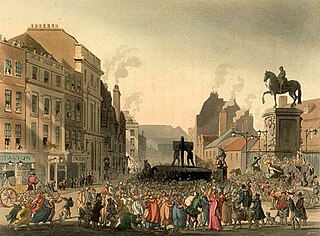Origins and meaning
Historically, the term "pocket" referred to a pouch worn around the waist by women in the 17th to 19th centuries. Skirts or dresses of the time had an opening at the waistline to allow access to the pocket which hung around the woman's waist by a ribbon or tape. The opening in the skirt was formed by leaving unstitched, near the waist, the panels of fabric for the skirt. Fabrics could be around 20 inches wide, so seaming the selvedges offered a reliable opportunity for an opening. Corresponding opening in the panels of fabric forming the petticoat underneath.
The rhyme was first recorded by James Orchard Halliwell in 1842, but there is evidence that it was popular in Britain and America at least in the early nineteenth century. [3] Various persons have been identified with Lucy Locket and Kitty Fisher. Halliwell suggested that they were "two celebrated courtesans of the time of Charles II", but no supportive evidence has been found. [3]
The name Lucy Locket was used by John Gay in Beggar's Opera (1728), but may have already been proverbial. [3] Kitty Fisher may have been Catherine Marie Fischer (d. 1767) a British courtesan who was the subject of three unfinished portraits by Joshua Reynolds and a number of songs, including an air recorded in Thompson's Country Dances (1760). [4]

"Yankee Doodle" is a traditional song and nursery rhyme, the early versions of which predate the Seven Years' War and American Revolutionary War. It is often sung patriotically in the United States today. It is the state song of the U.S. state of Connecticut. Its Roud Folk Song Index number is 4501.

"Georgie Porgie" is a popular English language nursery rhyme. It has the Roud Folk Song Index number 19532.

"Hey Diddle Diddle" is an English nursery rhyme. It has a Roud Folk Song Index number of 19478.
"Pussy Cat, Pussy Cat" or "Pussycat, Pussycat" is a popular English language nursery rhyme. It has a Roud Folk Song Index number of 15094.

"Jack Be Nimble" is an English language nursery rhyme. It has a Roud Folk Song Index number of 13902.

"Ring a Ring o' Roses", "Ring a Ring o' Rosie", or "Ring Around the Rosie", is a nursery rhyme, folk song and playground singing game. Descriptions first emerge in the mid-19th century, but are reported as dating from decades before, and similar rhymes are known from across Europe, with various lyrics. It has a Roud Folk Song Index number of 7925.

"Rain, Rain, Go Away" is a popular English language nursery rhyme. It has a Roud Folk Song Index number of 19096 and many different variations of it have been recorded.

"Solomon Grundy" is an English nursery rhyme. It has a Roud Folk Song Index number of 19299.
"Tinker, Tailor" is a counting game, nursery rhyme and fortune telling song traditionally played in England, that can be used to count cherry stones, buttons, daisy petals and other items. It has a Roud Folk Song Index number of 802. It is commonly used by children in both Britain and America for "counting out", e.g. for choosing who shall be "It" in a game of tag.

"One, Two, Buckle My Shoe" is a popular English language nursery rhyme and counting-out rhyme of which there are early occurrences in the US and UK. It has a Roud Folk Song Index number of 11284.

"There Was a Crooked Man" is an English nursery rhyme. It has a Roud Folk Song Index number of 1826.

"As I was going by Charing Cross", is an English language nursery rhyme. The rhyme was first recorded in the 1840s, but it may have older origins in street cries and verse of the seventeenth century. It refers to the equestrian statue of King Charles I in Charing Cross, London, and may allude to his death or be a puritan satire on royalist reactions to his execution. It was not recorded in its modern form until the mid-nineteenth century. It has a Roud Folk Song Index number of 20564.

"Monday's Child" is one of many fortune-telling songs, popular as nursery rhymes for children. It is supposed to tell a child's character or future from their day of birth and to help young children remember the seven days of the week. As with many nursery rhymes, there are many versions. It has a Roud Folk Song Index number of 19526.
"Cock a Doodle Doo" is an English nursery rhyme.
"Little Poll Parrot" is an English language nursery rhyme. It has a Roud Folk Song Index number of 20178.
"Taffy was a Welshman" is an English language nursery rhyme which was popular between the eighteenth and twentieth centuries. It has a Roud Folk Song Index number of 19237.
"I Love Little Pussy", alternatively called "I Love Little Kitty", is an English language nursery rhyme about a person who is kind to a pet cat. It has a Roud Folk Song Index number of 12824.

"Round and round the garden" is an English language nursery rhyme typically accompanied by fingerplay. It has a Roud Folk Song Index number of 19235.

"Girls and Boys Come Out to Play" or "Boys and Girls Come Out to Play" is a nursery rhyme that has existed since at least 1708. It has a Roud Folk Song Index number of 5452.

'I Had a Little Nut Tree' is an English language nursery rhyme. It has a Roud Folk Song Index number of 3749.The song mentions a visit by the daughter of the King of Spain to request nutmeg and a pear. James Orchard Halliwell suggested that the song commemorates the 1506 visit of the Queen regnant Joanna of Castile to the English court of her brother-in-law, Henry VII. However, the oldest known version of the song dates to 1797.
This page is based on this
Wikipedia article Text is available under the
CC BY-SA 4.0 license; additional terms may apply.
Images, videos and audio are available under their respective licenses.














